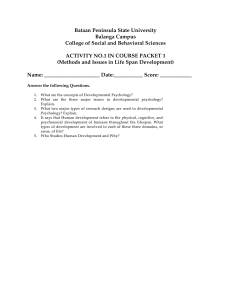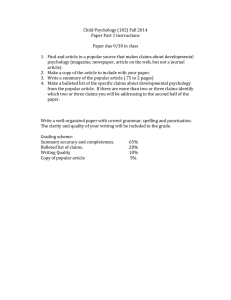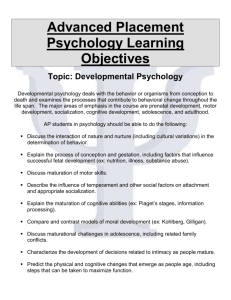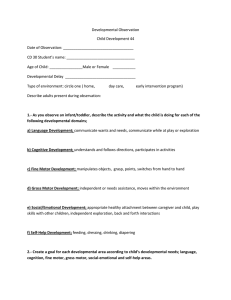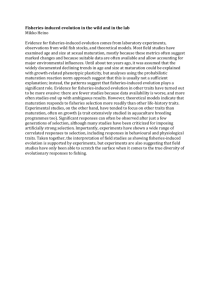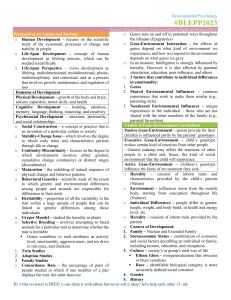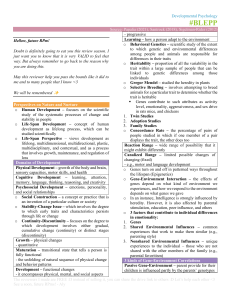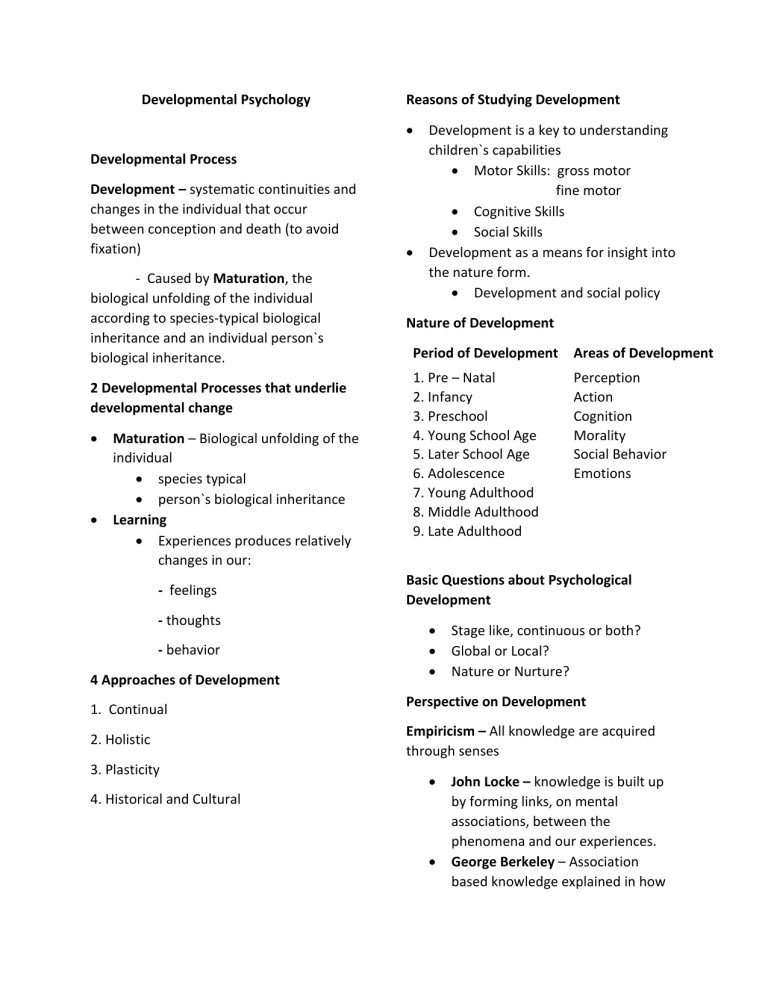
Developmental Psychology Reasons of Studying Development Developmental Process Development – systematic continuities and changes in the individual that occur between conception and death (to avoid fixation) - Caused by Maturation, the biological unfolding of the individual according to species-typical biological inheritance and an individual person`s biological inheritance. 2 Developmental Processes that underlie developmental change Maturation – Biological unfolding of the individual species typical person`s biological inheritance Learning Experiences produces relatively changes in our: - feelings - thoughts - behavior 4 Approaches of Development 1. Continual 2. Holistic 3. Plasticity Development is a key to understanding children`s capabilities Motor Skills: gross motor fine motor Cognitive Skills Social Skills Development as a means for insight into the nature form. Development and social policy Nature of Development Period of Development Areas of Development 1. Pre – Natal 2. Infancy 3. Preschool 4. Young School Age 5. Later School Age 6. Adolescence 7. Young Adulthood 8. Middle Adulthood 9. Late Adulthood Perception Action Cognition Morality Social Behavior Emotions Basic Questions about Psychological Development Stage like, continuous or both? Global or Local? Nature or Nurture? Perspective on Development Empiricism – All knowledge are acquired through senses 4. Historical and Cultural John Locke – knowledge is built up by forming links, on mental associations, between the phenomena and our experiences. George Berkeley – Association based knowledge explained in how we perceive and interpret the visual world. David Hume – used associationbased knowledge to develop a theory about how humans understand cause and effect relationship. Nativism - The nativists agreed that these in born capacities (knowledge) were more specialized and more complex than the general associative mechanism proposed by the empiricists. Comparative and Evolutionary - cross-species; - generational same time - ask how and why a particular trait, whether it is a body part or behavior, emerged over successive generations of a population through the process of natural selection. - Ethology – the study of traits from an adaptive evolutionary perspective that usually involves comparisons across species. Thus, ethologists examine how certain traits improves as species fitness within its specific environment, conferring advantages that make members of the species that have these traits more likely to survive and produce viable offspring. Cross Cultural Main issues : 1. How do cultural variations influence patterns of development? 2. What aspects of behavior or mind, if any, develop in the same way throughout the world? Neuroscience- Maturation of the brain - Nervous system changes as a result of experiences. Behaviorist - Focus on observable behaviors and how they are shaped by external factors over the course of development. - Deliberately ignore all information about mental states and processes. Psychoanalytic – Emphasize the power of the unconscious thoughts and emotions occurring outside awareness – to affect behavior - the view that many kinds of psychological problems are result of conflicts between different components of the mind. Cognitive Science different types of information processing take lace in real organism in real time. Psychology Computer Linguistics Science Cognitive Science Philosophy Neuroscience Research Strategies: Basic Methods of Designs What makes scientific psychology scientific? Observation Question Reject hypothesis Results Experiment Hypothesis Prediiction Objective - everyone who examines the data will have the same conclusions Replicable- Everytime the method is used it results in the same data and conclusions. Basic Fact-Finding Strategies Self-report Methodologies - Interviews and Questionnaires Scientific method because of empiricism Theory does not guarantee validity. ( Greasley, 2006) Reliability – yields consistent information over time and across others Validity – It measures what it is supposed to measure An instrument must be reliable before it can possibly be valid. Yet reliability, by itself, Observational Methodology -
